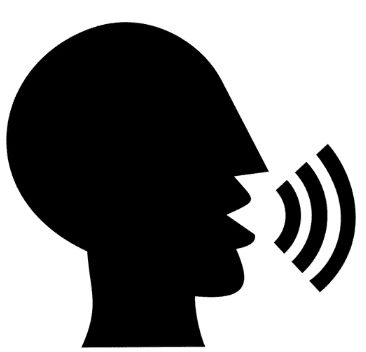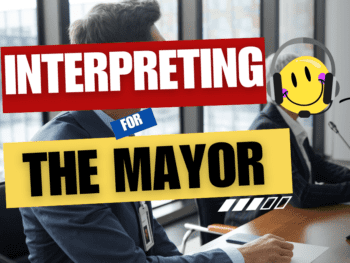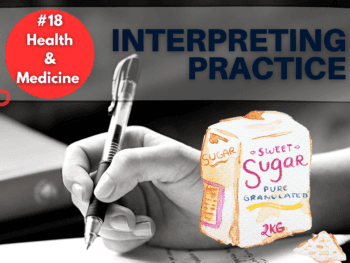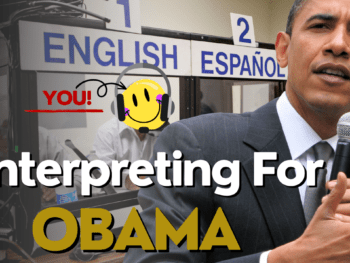Confused about the difference between Translation and Interpretation? In what ways is a translator different from an interpreter? This article explains everything you need to know in simple terms.
Everybody knows what translators do. It’s a well known profession, the basic concept behind it is no secret to the general public.
You give them a text that is written in a language and they return that same text to you in another language. A translator translates – that’s essentially what the job is about.
What’s not so clear to some people is what an interpreter is. The activity itself is also well known to the most part, but not everyone uses the correct term when referring to it.
I often hear people using expressions such as ‘verbal translation‘ or ‘oral translation‘.
That’s not fundamentally wrong. Indeed, the activity consists in the act of translating (or ‘rendering‘) spoken language. The correct term for the practice, however, is interpreting.
To put it simply, this is the most fundamental difference between the two professions:
- A translator is a linguist who ‘transfers’ written content from one language to another language.
- An interpreter is a linguist who ‘transfers’ verbal content from one language to another language.
Here’s an illustrative scenario to put this distinction into perspective:
- Legal Law & Co LLP are a solicitors firm. They need to translate a batch of tax returns from Spanish into English for their client’s court case. What they need in this situation is a translator.
- Now the same firm needs to arrange a meeting with their client in order to prepare his defense. The client only speaks Spanish, while the solicitors only speak English. What they need in this situation is an interpreter.
In a sense, both scenarios involve the translation of content from a language to another. However, as we will see in this post, the way that’s done in each case is drastically different.
Note: I’ll be focusing on ‘spoken’ language in this post when it comes to interpreting, but it’s important to mention there is a particular type of interpreting that isn’t actually spoken: Sign Language! 🙂
Interpreter vs Translator: A Comparison
The ‘written vs spoken‘ aspect that distinguishes translation from interpretation is not just a mere detail. A good translator is not necessarily a good interpreter, and vice-versa.
Indeed, the set of skills involved in translating is drastically different from the set of skills involved in interpreting.
The table below draws a clearer comparison between the translation and interpreting:
Translation | Interpreting | |
How | Written | Orally |
Immediacy | Not Immediate (Can be checked and revised any time) | Immediate (presented only once, translation needed on the spot) |
Where | The linguist mostly works from home | The linguist mostly travels and commutes to where the assignment takes place |
Settings | Translation of documents, literary translation, specialist translation (legal, medical, engineering, etc.), and so forth. | Interpreting in business meetings, conferences, public service (court, hospitals, etc.), and so forth. |
Example | 'Translation of a 4,500-word financial report from Spanish into English' | 'Simultaneous interpretion from Spanish to English on an pharmaceutical advisory board meeting' |
As you can see, even if it all comes down to transferring meaning across languages and cultures, these are still two completely separate activities with different requirements.
Becoming a Translator or an Interpreter
To be performed at the highest professional standard, each activity requires years of training and practice. Some professionals specialise in both, while others prefer to stick to just one.
It is common nowadays for aspiring translators and interpreters to enter a university degree programme. Although that’s probably desirable, it is not compulsory. There are alternative certifications and training courses that are also suitable.

It is important to be aware that the translation industry has no particular official barriers at entry level. There’s nothing preventing anyone from offering translation or interpreting services even if that’s something they’ve never done in their lives.
On the other hand, that same apparent ease to enter the industry makes it over-competitive and in a constant state of excess supply.
Because of that, translation agencies are increasingly more cautious about the linguists they assign projects to and are setting higher admission criteria.
Aspiring linguists should therefore seek formal training in most cases. The higher their level of specialisation, the higher their chances of getting work.
Continue Reading:
As for clients, asking for proof of qualification and/or experience (if dealing directly with a linguist) or trusting ISO-compliant companies (if dealing with a translation agency) is advisable.
Which One is the Most Difficult?
That’s subject to debate – and indeed, it is highly debated among professionals and academics alike.
It also depends on your personal skills. If you dread public speaking but love writing, you are likely to find interpreting harder; if your communication skills are excellent but writing is not your thing, translation will probably come across as more difficult.

To make things even more complicated, there are different interpreting modes (consecutive, simultaneous, dialogue, etc.), each one presumably bearing its own level of difficulty (once again subject to debate).
In my humble opinion, I find interpreting to be the hardest of the two practices. I support my claim with its immediacy, which makes interpretation much more prone to cognitive overload than translation.
This is not to say by any means that I find translation easy or less of a profession (I certainly don’t, in fact most of my freelance work comes from the translation side of things.)
Unlike interpreting, there’s absolutely no room for inaccuracies (tiny as they may be) when translating – you are always expected to be perfect. Translators are also constantly fighting against time as deadlines tend to be notoriously tight, so the job is anything but stress-free.
Translation Rates vs Interpreting Rates
There are always exceptions to the rule, but, generally speaking, interpreting rates tend to be higher than those practiced in translation.
It mostly comes down to supply and demand: there are more translators than interpreters in the market.
The nature of each practice also plays its role. Being about written content, translation is normally paid by the word; interpreting, on the other hand, is paid by the hour.

If we calculate the hourly income, translators will almost inevitably be at a disadvantage. A 1,000-word document may either take 1 hour or 3 hours to be translated – the linguist is paid the same regardless, i.e., only the number of words matter.
As for interpreters, 1 hour always equates to 1 hour. If the assignment goes over the initial booking, the interpreter is entitled to charge for the additional time.
With that said, in both cases the exact rates may vary drastically depending on:
- Language Combination: Some language combinations are more expensive than others. Once again, that is mostly determined by supply and demand.
- Linguist’s Experience and Level of Expertise: The more experienced and specialised the linguist, the higher the rates.
- Subject Matter: Highly technical fields (e.g., engineering) are expected to cost more than more general ones (e.g., greetings letters.)
- Interpreting Mode: Within interpreting alone, rates vary massively depending on the type of interpreting. Simultaneous interpreting is likely to cost more than consecutive interpreting; consecutive interpreting is likely to cost more than dialogue interpreting.
That’s why I always recommend linguists to strive to stand out from the crowd. Learning new skills, technical fields and even working languages is what allows a linguist to charge more for their services.
Finally, from the client’s perspective, one thing to take into account is that the final cost will inevitably be higher if the services are booked through an agency.
Dealing with agencies brings about several advantages, but, quite naturally, a mark-up needs to be added in order to pay the project manager and allow the company to make some profit. Nothing wrong with that, just something to bear in mind!
Conclusion
The most simple way to distinguish a translator from an interpreter is by looking at how the source text is presented and how the target text is delivered:
- Is it a written text (such as a document) to be translated into another language, also in writing? That’s the translator’s job!
- Is it an oral text (such as in a meeting) to be translated into another language, right there on the spot, to mediate the conversation? That’s the interpreter’s job!
If you’ve found this post helpful or think it could be useful to a friend who perhaps is – or is planning to become – a translator or interpreter, please kindly consider buying me a coffee by using the button below:
I put all my heart and soul into the content I produce in order to help my fellow linguists set foot in the industry. Most of what I do is available to everyone for free.
Donating is 100% optional, but greatly appreciated. A short espresso will do! ☕

















 Online Work From Home: Setting up a Home Office (Cheap & Easy)
Online Work From Home: Setting up a Home Office (Cheap & Easy)